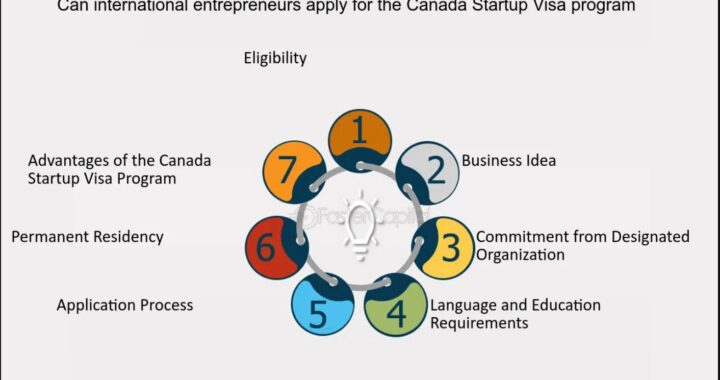What are changes in Canada Start up Visa Program and Self-Employed Persons Program. How would it affect the potential immigrants to Canada?

Canada Self Employment Visa Program
Canada’s Start-Up Visa Program: A Pathway to Permanent Residency for Aspiring Entrepreneurs
Canada, a nation known for its welcoming immigration policies, offers a unique opportunity for foreign entrepreneurs through the Start-Up Visa (SUV) Program. This program allows immigrant entrepreneurs with innovative business ideas to establish their ventures in Canada and gain permanent residency.
Here are intricacies of the Start-Up Visa Program, covering eligibility requirements, the application process, key changes implemented in April 2024, and its potential impact on aspiring immigrant entrepreneurs.
What is Start-Up Visa (SUV) Program: – Understanding the Program’s Objectives
The Canadian government established the Start-Up Visa Program with two primary goals:
- Attract Global Talent: Canada seeks to attract highly skilled and innovative entrepreneurs who can contribute to the country’s economic growth by creating jobs and fostering new technologies or industries.
- Promote Business Development: By facilitating the immigration of promising entrepreneurs, Canada aims to stimulate business activity, increase competition, and foster a more vibrant and diverse entrepreneurial ecosystem.
Eligibility Requirements for Start up Visa Program- Canada:
To qualify for the Start-Up Visa Program, applicants must meet several key requirements:
1. Qualifying Business:
- Innovation: The core business concept must demonstrate innovation, offering a unique product or service with the potential to disrupt existing markets or address unmet needs.
- Job Creation: The business plan should show a clear path for creating new jobs in Canada, contributing to the country’s employment landscape.
- Global Competitiveness: The business should have the potential to compete on a global scale, showcasing its viability and ability to thrive in the international market.
2. Letter of Support:
Obtaining a letter of support from a Designated Organization (DO) is a crucial step. These organizations are angel investor groups, venture capital funds, or business incubators specifically approved by the government to assess and support immigrant entrepreneurs.
Securing a letter of support demonstrates the viability of your business idea and your potential for success. Each DO has its own selection criteria and application process, so research potential partners and tailor your approach to each one.
3. Language Requirements:
Applicants must demonstrate proficiency in either English or French by achieving the minimum Canadian Language Benchmarks (CLB) score set by Immigration, Refugees and Citizenship Canada (IRCC). The required CLB score varies depending on the program stream you choose (explained later).
4. Settlement Funds:
You’ll need sufficient financial resources to support yourself and your dependents upon arrival in Canada. The required amount varies depending on family size and is periodically adjusted by IRCC.
5. Personal and Business History:
Be prepared to demonstrate a strong personal and business background. Relevant work experience, educational qualifications, and any past entrepreneurial ventures can strengthen your application.
6. Adaptability:
Canada welcomes individuals with a willingness to integrate into Canadian society and contribute positively to their chosen communities.
Application Process for Start Up Visa Program: A Step-by-Step Guide
The application process for the Start-Up Visa Program involves several key stages:
- 1. Prepare your Business Plan: Develop a comprehensive and well-researched business plan that clearly outlines your innovative idea, target market, competitive advantage, financial projections, and job creation strategy.
- 2. Research Designated Organizations: Identify Designated Organizations that align with your industry and business goals. Carefully study their investment criteria and application procedures.
- 3. Connect with Designated Organizations: Approach your chosen Dos and present your business plan. Demonstrate your passion, expertise, and commitment to building a successful venture in Canada.
- 4. Secure a Letter of Support: If a DO believes in your business idea and your potential, they will issue you a letter of support, signifying their commitment to financially back your venture.
- 5. Submit your Permanent Resident Application: Once you have a letter of support, you can submit your permanent resident application to IRCC. The application package will include detailed information about your business, supporting documentation from the DO, and proof that you meet all other eligibility requirements.
- 6. Medical Examination and Security Checks: You and your family members will be required to undergo medical examinations and security checks as part of the application process.
- 7. Biometrics Collection: Fingerprints and a digital photograph will be collected for further verification.
- 8. Processing and Landing: After a thorough review by IRCC, successful applicants will receive a Confirmation of Permanent Residence (COPR) document allowing them to enter Canada and begin building their businesses.
Changes in Start up Visa Program effective 1st May2024
In an effort to reduce application backlogs and improve processing times, Canada’s Immigration, Refugees and Citizenship Canada (IRCC) implemented significant changes to these two programs on April 30, 2024. Here’s a breakdown:
Limited Applications per Designated Organization:
The number of permanent resident applications accepted annually are capped at those associated with a maximum of 10 start-ups per Designated Organization (DO). These organizations assess and support immigrant entrepreneurs.
Priority Processing for Tech Network Members:
Start-ups supported by a Canadian capital venture capital firm or business incubator belonging to Canada’s Tech Network will receive priority processing for their permanent residence applications. This applies to both new applications and those already in the system.
Self-Employed Persons Program: a Program on Pause:
The program is currently not accepting new applications. IRCC will focus on clearing the existing backlog while they evaluate and reform the program for better efficiency and integrity.
What are the Changes to these programs and How These Changes Affect Potential Immigrants
Canada’s Self-Employed Persons Program: A Path on Pause (as of May 1, 2024)
Canada’s Self-Employed Persons Program was an economic immigration pathway designed for foreign individuals with exceptional talent and experience in cultural fields like arts, athletics, or recreation. Unfortunately, as of April 30, 2024, the program is no longer accepting new applications.
What is Self Employed Persons Program, reasons for Pausing this program and the potential impact on aspiring immigrant cultural professionals in Canada.
Program Structure of Self Employed Persons Program: A Look Back
The Self-Employed Persons Program operated under a point-based selection system. Applicants were evaluated based on factors like:
- Experience: Extensive and demonstrably successful experience in their chosen cultural field.
- Self-Employment Ability: A clear plan and evidence of their ability to establish themselves successfully as self-employed individuals in Canada.
- Educational Background: Relevant educational qualifications and training in their field.
- Cultural Contribution: Potential to make a significant and positive contribution to Canada’s cultural landscape.
- Adaptability: A willingness to integrate into Canadian society and contribute to their chosen communities.
- Language Skills: Proficiency in English or French to meet the Canadian Language Benchmarks (CLB) score set by Immigration, Refugees and Citizenship Canada (IRCC).
By accumulating enough points across these categories, applicants could be invited to apply for permanent residency in Canada.
Reasons for Pausing Self Employed Persons Program
The IRCC implemented a temporary pause on the Self-Employed Persons Program due to several factors:
- High Application Backlog: The program experienced a surge in applications, leading to lengthy processing times exceeding four years. This backlog created delays for qualified applicants and inefficiencies in the system.
- Program Review: IRCC intends to utilize the pause to conduct a comprehensive review of the program. This review aims to identify areas for improvement and ensure the program continues to attract high-calibre cultural professionals while streamlining the application process.
- Potential Reforms: The review may lead to reforms in the program’s selection criteria, application process, or focus areas to better align with Canada’s evolving cultural needs.
Current Status and Future Implications and likely date of reopening this program
As of May 1, 2024, there is no official date for when the Self-Employed Persons Program will reopen or what the reformed program might look like. This creates significant uncertainty for aspiring immigrant cultural professionals who were considering this pathway.
Potential Impact on Applicants:
- Discouragement: The program’s pause may discourage some talented individuals from pursuing their dreams of establishing themselves in Canada’s cultural scene.
- Delay in Immigration Plans: Those who were actively preparing applications may face delays in their immigration timeline.
- Increased Competition: If and when the program reopens, competition for a limited number of spots may rise due to pent-up demand.
Recommendations for Aspiring Applicants for Self Employed Persons Program:
- Stay Informed: Regularly check the IRCC website for updates on the program’s status and any potential reforms.
- Develop Your Skills: Continue honing your skills and building a strong portfolio in your chosen field.
- Explore Alternative Pathways: Research other immigration programs that might align with your skills and experience, such as the Provincial Nominee Programs offered by some Canadian provinces.
The pause on the Self-Employed Persons Program may present a temporary hurdle, but it doesn’t necessarily signify the end of opportunities for talented cultural professionals seeking to immigrate to Canada. By staying informed, adaptable, and continuously developing your skills, you can be well-positioned to take advantage of future immigration opportunities in Canada’s vibrant cultural landscape.
Increased Competition: With a limit on applications per Designated Organization, competition for those slots will likely be fierce. Entrepreneurs will need strong business plans and support from top-tier Designated Organizations.
Faster Processing for Qualified Applicants: Businesses backed by qualified venture capital firms or incubators can expect a faster path to permanent residency.
Uncertain Future: There’s no clear timeline for when the program will reopen or what the reformed program might look like. This creates uncertainty for potential immigrants in cultural fields who were considering this pathway.
Overall Impact of pausing Self Employed Persons Program for canadian Immigration:
Potential Discouragement: The changes may discourage some aspiring immigrant entrepreneurs, particularly those without strong connections to venture capital or lacking qualifications for the reformed Self-Employed program.
Focus on Quality over Quantity: The aim is to streamline the process and attract high-potential businesses that can contribute significantly to the Canadian economy.

 Can Immigration consultants help save from getting deported from US? How much could be the cost and chances of success?
Can Immigration consultants help save from getting deported from US? How much could be the cost and chances of success?  What are Options before an immigrant in USA if he is served Deportation Order
What are Options before an immigrant in USA if he is served Deportation Order  In-Demand Jobs in Various Canadian Provinces: A Guide for Foreign Workers and LMIA Opportunities
In-Demand Jobs in Various Canadian Provinces: A Guide for Foreign Workers and LMIA Opportunities  Canada Cracking Down on Exploitative Employment Practices: An attempt to prioritize native workers over Temporary Foreign Workers
Canada Cracking Down on Exploitative Employment Practices: An attempt to prioritize native workers over Temporary Foreign Workers  What actions by Trump Government are in store for illegal immigrants in US? What are Challenges to deport illegal immigrants from US?
What actions by Trump Government are in store for illegal immigrants in US? What are Challenges to deport illegal immigrants from US?  Launch Your Dreams: A Guide to Canada’s Start-Up Visa Program for Global Entrepreneurs
Launch Your Dreams: A Guide to Canada’s Start-Up Visa Program for Global Entrepreneurs  Understanding Self Employment Visa for Quick Immigration to UK, its eligibility, fees, limitations and the process to apply
Understanding Self Employment Visa for Quick Immigration to UK, its eligibility, fees, limitations and the process to apply